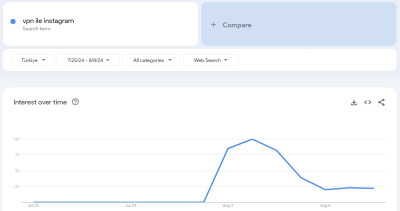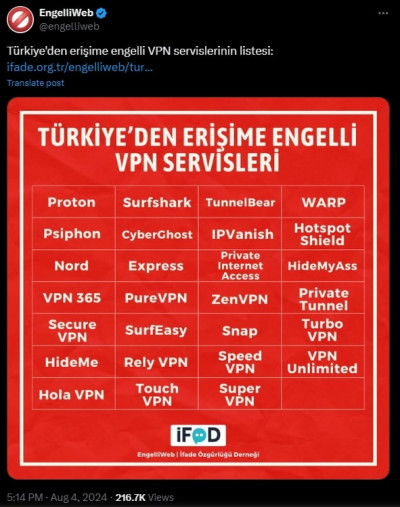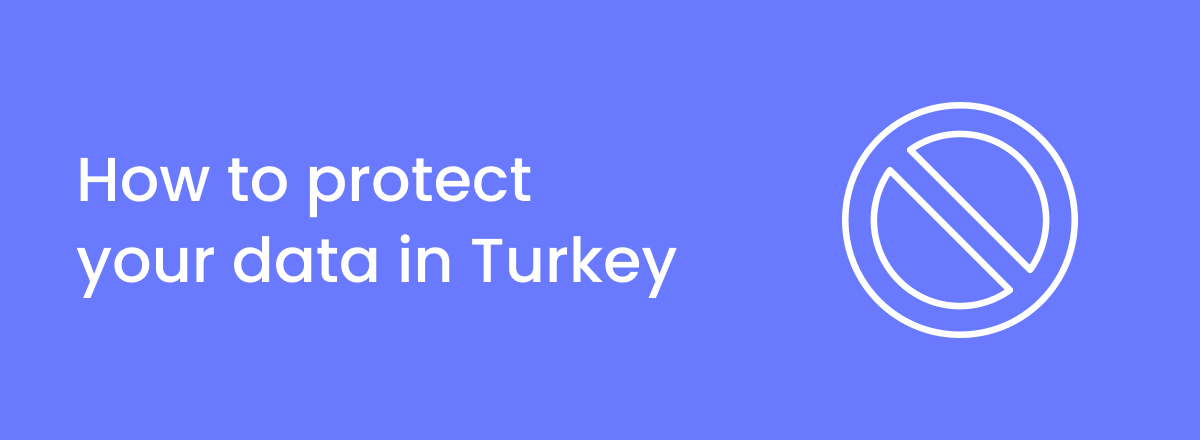The news hit headlines on August 2, 2024, that the Turkish government began blocking platforms like Instagram, and shortly after – VPNs. According to the Turkish EngelliWeb project of the Freedom of Expression Association (İFÖD), the country has already blocked access to 27 popular VPN apps.
The move to ban Instagram came after the platform was accused of blocking condolence posts regarding the assassination of the Palestinian militant group Hamas leader Ismail Haniyeh. However, the official reason for VPN blocking hasn’t been released, but there are speculations that suggest it was done to prevent alternative access methods.
Still, Turkish users are seeking solutions to protect their data, ensure privacy, and even access restricted platforms. So, in this article, we’re going to teach you how to protect your data in Turkey, possible reasons for the ban, and more.
Why did Turkey ban VPNs?
After the nationwide Instagram ban, the reason for the VPN block has not been stated officially, raising speculation that it was done to avoid workarounds to access the blocked platform.
According to Statista, Instagram was used by 58 million users in Turkey as of February 2024. Naturally, after the Instagram block, which happened on Friday, August 2, 2024, many were looking for alternative ways to enter the platform.
This phenomenon can be noticed on Google Trends data. VPN-related Google search terms became breakout queries as of August 2, 2024, including “VPN” and “VPN ile Instagram” (translated as “VPN with Instagram”).
Both of the queries rose to 100 – which is the peak popularity value in Google Trends.

Source: Google Trends
Considering this is not the first time Turkey has imposed blocks on the internet, government officials may have noticed a trend in the use of VPNs during such cases and took drastic measures.
In January 2024 alone, 16 VPNs, such as TunnelBear and Proton VPN, were also blocked following the ban of online media outlets.
“... Occasionally we have been seeing orders from the government bodies for ISPs [internet service providers] to target services and block access to content,” digital media specialist Gürkan Özturan told Brussels Signal.
He pointed out that many Turkish people sought other ways to access websites then too.
“... Many people, including even children, have learned alternative methods of accessing content,” Özturan said.
List of VPN services banned in Turkey
On August 4, the EngelliWeb project of the Freedom of Expression Association (İFÖD), a nonprofit and non-government organization, shared that 27 VPNs in Turkey are already blocked.
This includes market giants, such as ExpressVPN, Surfshark, NordVPN, and others.
You can see the full list of blocked VPN services in the organization’s tweet below.

Many raise the question: “Is it illegal to use a VPN in Turkey?” While the country is blocking many providers, there is no law stating that it is illegal to use it. So, if you find a service that works in your region, you can still sign up and protect your privacy.
How to protect your data in Turkey
After the VPN bans, you may be wondering how you can continue protecting your data while being in or traveling to Turkey. There are a few ways you can ensure privacy and security for your devices:
1. Non-blocked VPN
VPNs (Virtual Private Networks) are usually the most popular methods to protect your data and access geo-restricted content. Multiple VPN providers have reportedly said that while bans are taking place in Turkey, some users can still access the services.
So, you can try giving services like NordVPN a try using free trials or money-back guarantees. For example, you can use NordVPN for 3 days free on Android or for 30 days on any other device and cancel before the return policy expires.
And if you’re planning to travel to Turkey with a VPN, try downloading a few free VPN services in case some of them don’t work. This way, you have a higher chance of protecting your personal information or even bypassing restrictions.
Lastly, if all else fails, you can try building your own VPN. However, that requires quite some technical knowledge, so keep in mind that it can take a lot of time and learning.
2. Tor browser
Tor (The Onion Router) is a browser that helps users access the internet privately by anonymizing traffic. The way it works is it hides your IP address and browsing activities by redirecting your traffic through thousands of nodes, which are volunteer-run servers.
Many people use this browser for researching information that is specifically restricted in their country or for keeping their data safe from marketers, ISPs, and identity thieves. It can also be used for accessing geo-restricted platforms, including Instagram and the recently blocked Roblox game.
If the browser alone doesn’t work, you can also try using Tor to get a VPN app that would help access blocked platforms.
But keep in mind that Tor doesn’t come without downsides. For starters, since your traffic goes through many servers, you’re going to have a much slower browsing experience. Additionally, setting Tor up can be challenging for non-technical users.
3. Antivirus
If you wish to protect yourself from malware and identity theft, then using an antivirus is the way to go. The best antivirus software is known for securing devices and the data on them by scanning them and preventing malicious threats before they can do harm.
But some antiviruses come with extra security features. For example, TotalAV provides users with an Identity Theft Protection feature. It monitors your credit card details, alerts you in case of any data breaches, and assists with restoring stolen information.
Conclusion
With Turkey banning loads of popular VPN services, many people are left without the right to internet freedom and online privacy, no matter if you’re a regular resident or a traveler.
However, there are still ways to protect your data in the online world. Signing up to multiple free VPNs before traveling to Turkey is just one of the ways. You can also set up the Tor browser to ensure more private browsing, try getting a VPN through Tor, or use an antivirus to prevent malware and identity theft no matter where you are.
Frequently asked questions
According to the country’s minister of justice, Turkey banned access to the popular game called Roblox because it raised concerns about child security, claiming the content could potentially lead to child abuse.


